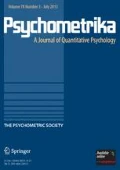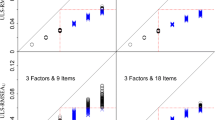Abstract
Following a general approach due to Guttman, coefficientα is rederived as a lower bound on the reliability of a test. A necessary and sufficient condition under which equality is attained in this inequality and hence thatα is equal to the reliability of the test is derived and shown to be closely related to the recent redefinition of the concept of parallel measurements due to Novick. This condition is then also shown to be closely related to the unit rank assumption originally adopted by Kuder and Richardson in the derivation of their formula 20. The assumption later adopted by Jackson and Ferguson and the one adopted by Gulliksen are shown to be related to the necessary and sufficient condition derived here. It is then pointed out that the statement that “coefficientα is equal to the mean of the split-half reliabilities” is true only under the restricted condition assumed by Cronbach in the body of his derivation of this result. Finally some limitations on the uses of any function ofα as a measure of internal consistency are noted.
Similar content being viewed by others
References
Cronbach, L. J. Coefficient alpha and the internal structure of tests.Psychometrika, 1951,16, 297–334.
Cronbach, L. J., Rajaratnam, Nageswari, & Gleser, Goldine C. Theory of generalizability: A liberalization of reliability theory.Brit. J. Statist. Psychol., 1963,16, 137–163.
Cureton, E. E. The definition and estimation of test reliability.Educ. Psychol. Measmt., 1958,18, 715–738.
Dressel, P. L. Some remarks on the Kuder-Richardson reliability coefficient.Psychometrika, 1940,5, 305–310.
Gulliksen, H.Theory of mental tests. New York: Wiley, 1950.
Guttman, L. Reliability formulas that do not assume experimental independence.Psychometrika, 1953,18, 225–239.
Hoyt, C. Test reliability estimated by analysis of variance.Psychometrika, 1941,6, 153–160.
Jackson, R. W. B., & Ferguson, G. A. Studies on the reliability of tests. Bulletin 12, Department of Educational Research, University of Toronto, 1941.
Kuder, G. F., & Richardson, M. W. The theory of the estimation of test reliability.Psychometrika, 1937,2, 151–160.
Lord, F. M. Statistical inferences about true scores.Psychometrika, 1959,24, 1–17.
Lyerly, S.B. The Kuder-Richardson formula (21) as a split-half coefficient and some remarks on its basic assumption.Psychometrika, 1958,23, 267–270.
Novick, M. R. The axioms and principal results of classical test theory.J. Math. Psychol., 1966,3, 1–18.
Rulon, P. J. A simplified procedure for determining the reliability of a test by splithalves.Harvard Educ. Rev., 1939,9, 99–103.
Author information
Authors and Affiliations
Additional information
Research reported herein was supported in part by the Logistics and Mathematical Statistics Branch of the Office of Naval Research under contract Nonr-4866(00), NR 042-249, Melvin R. Novick, principal investigator. Reproduction, translation, publication, use and disposal in whole or in part by or for the United States Government is permitted. The authors are indebted to Frederic M. Lord, Michael Browne and an unknown referee for constructive criticism of earlier drafts of this manuscript.
Rights and permissions
About this article
Cite this article
Novick, M.R., Lewis, C. Coefficient alpha and the reliability of composite measurements. Psychometrika 32, 1–13 (1967). https://doi.org/10.1007/BF02289400
Received:
Revised:
Issue Date:
DOI: https://doi.org/10.1007/BF02289400




